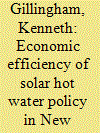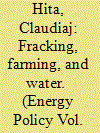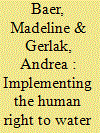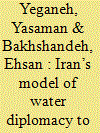|
|
|
Sort Order |
|
|
|
Items / Page
|
|
|
|
|
|
|
| Srl | Item |
| 1 |
ID:
090039


|
|
|
|
|
| Publication |
2009.
|
| Summary/Abstract |
New Zealand has recently followed the path of several other countries in promoting solar hot water (SHW) systems in the effort to reduce greenhouse gas emissions, yet the economic efficiency of large-scale policies to encourage SHW remains a pressing question for policymakers. This paper develops an economic framework to examine policies to promote SHW in New Zealand, including the current information, training, and subsidy policy. The economic framework points to environmental, energy security, and average-cost electricity retail pricing market failures as motivation for SHW policy, with the global climate change externality the most important of these. The results indicate that domestic SHW systems are close to being financially attractive from a consumer perspective, but a more substantial subsidy policy would be necessary for SHW to appeal to a wider audience. Such a policy is far more likely to have positive net benefits than a policy of mandating SHW on all homes or all new homes in New Zealand, and could be justified on economic efficiency grounds under reasonable assumptions. However, this result reverses under an economy-wide carbon trading system that internalizes the environmental externality.
|
|
|
|
|
|
|
|
|
|
|
|
|
|
|
|
| 2 |
ID:
089617


|
|
|
|
|
| Publication |
Washington, D C, World Bank, 2009.
|
| Description |
xviii, 189p.
|
| Standard Number |
9780821379400
|
|
|
|
|
|
|
|
|
|
|
|
Copies: C:1/I:0,R:0,Q:0
Circulation
| Accession# | Call# | Current Location | Status | Policy | Location |
| 054278 | 333.9106/HIR 054278 | Main | On Shelf | General | |
|
|
|
|
| 3 |
ID:
175228


|
|
|
|
|
| Summary/Abstract |
Several studies note the large quantity of water used to hydraulically fracture oil and gas wells. We quantify this water use and its effects on water use for irrigating crops. For nine western states in 2017, water use in fracking represented 1.7 percent of water use in irrigation overall, but up to 55 percent in the Bakken shale of North Dakota, 28 percent in Oklahoma shale regions, and 12 percent in the Eagle Ford shale of Texas. However, in counties where the percentage of water use for fracking relative to irrigation is large, it is primarily because such counties have had minimal historical irrigation. We analyze the effect of state water policies governing the transfer of water from farming to fracking on water withdrawals for the two sectors. In North Dakota, which allowed farmers to forego irrigating and sell water to energy firms, each acre-foot of water used in fracking displaced about 1.1 acre feet from irrigation, thereby avoiding an increase in total withdrawals. Weaker evidence suggests an increase in irrigation in Oklahoma and Texas. Because of the lack of displacement in Texas and Oklahoma, concerns that fracking contributes to excess withdrawals in the present time may be warranted.
|
|
|
|
|
|
|
|
|
|
|
|
|
|
|
|
| 4 |
ID:
140968


|
|
|
|
|
| Summary/Abstract |
This article explores global and local discourses on how to implement the newly recognised human right to water and sanitation (HRtWS). We analyse the potential limitations of the human rights frame in the context of critiques that human rights are a liberal, Western discourse that does not reflect the lived experiences of non-Western countries. Through two case studies we find that there are two discourses emerging on how to implement the HRtWS. At the global level, as seen in the work of the UN Special Rapporteur on the HRtWS, we find a hegemonic discourse that is state-centric and market-friendly. In Bolivia, a country currently implementing a human rights-based approach to water services, we find a counter-hegemonic discourse on implementation. We argue that the hegemonic discourse is incomplete and does not fully address barriers to fulfilment of the right, such as state corruption and the needs of peri-urban residents.
|
|
|
|
|
|
|
|
|
|
|
|
|
|
|
|
| 5 |
ID:
186389


|
|
|
|
|
| Summary/Abstract |
Many countries of the world are suffering from the adverse consequences of water scarcity. The United Nations has estimated that, by the middle of the present century, about 7 billion people in 48 countries, mostly from Southwest Asia, will encounter water scarcity. This may be expedited by the adverse consequences of climate change and global warming which would escalate the risk of war and conflict over transboundary resources. The present research explores the ways water diplomacy can mitigate the dire effects of water scarcity and promote “treaty making” and “institution building” as well as multilateral cooperation on shared waters. The focus is on Iran's water diplomacy with neighboring countries over transboundary resources to forge cooperation and hamper conflict. Our findings suggest that Iran's water diplomacy is constructed on principles of “goodwill and cooperation,” “non-significant harm,” “environmental protection,” and “exchange of data and information” on shared water resources with its neighboring riparian states. Such a model, which has resulted in no dispute between Iran and some of its neighbors such as Pakistan, Turkmenistan, and Armenia in recent years, demonstrates the broader benefits of Iran's approach to water diplomacy and paves the way for stronger cooperation in other areas of mutual interest. Additionally, it encourages multilateral engagement and “hydrosolidarity” within the framework of agreements and the formation of joint “water commissions” for the equitable and reasonable distribution of water among riparian states in line with the 1997 UN Watercourses Convention.
|
|
|
|
|
|
|
|
|
|
|
|
|
|
|
|
| 6 |
ID:
114579


|
|
|
|
|
| Publication |
2011.
|
| Summary/Abstract |
China's water abstraction policies are significant for illustrating the application of market-based instruments in a transitional and developing country and for shedding light on improving China's water management system. This article presents a new approach to analysing applications of market-based instruments for water resources in China. Expanding the analysis beyond a rational choice approach, it demonstrates the institutional dimension of policy implementation at the local level in China. Four peculiar features of China's water institutions influence local governments in dealing with water abstraction differently from how regulators might expect. This explains local governmental failures and the implementation of water abstraction policies in several ways, including the setting of charges at low levels, a lack of necessary monitoring and sanctions, few incentives to collect charges diligently, and failure to provide accessible information for the public.
|
|
|
|
|
|
|
|
|
|
|
|
|
|
|
|
| 7 |
ID:
132375


|
|
|
|
|
| Publication |
2014.
|
| Summary/Abstract |
India's Ganges River has suffered from massive amounts of pollution for decades, and despite numerous attempts, the Indian government has failed to clean up this historic water resource. This governance failure prompted the growth of civil society groups whose stated purposes included the mitigation of Ganges pollution and the empowerment of community-based solutions. These types of groups, however, have not found sustained success in alleviating Ganges pollution, despite their compatibility with the constitutional decentralization of Indian water policy. A case study of one of these civil society organizations, the Sankat Mochan Foundation (SMF), serves as a first step in assessing the efficacy of this community-based approach to Ganges pollution mitigation. From a broader perspective, the story of the SMF speaks to the difficulties inherent in environmental policy decentralization and to the struggles of norm creation and diffusion across societies. Indeed, this case is particularly instructive, as it exposes potential vulnerabilities in the literature regarding the role of civil society groups as norm entrepreneurs. Rather than allow for the democratization of water policy, as called for by the Indian constitution, the case of the SMF suggests the Indian government has entrenched centralization to the point of diffusing civil society opposition and ultimately compromising the overall impact of its resistance.
|
|
|
|
|
|
|
|
|
|
|
|
|
|
|
|
| 8 |
ID:
023065


|
|
|
|
|
| Publication |
Dec 7, 2002.
|
| Description |
4907-4914
|
|
|
|
|
|
|
|
|
|
|
|
|
|
|
|
| 9 |
ID:
189716


|
|
|
|
|
| Summary/Abstract |
The 2022 floods that affected 33 million people in Pakistan resulted from a confluence of factors. The nation is highly vulnerable to climate change, which requires international action. But internal governance reforms are needed to improve the state’s ability to help citizens recover from the floods and better prepare for future natural disasters. Pakistan has mismanaged its natural resources and is mired in economic and political crises. In rural areas, colonial-era patterns persist in unequal control over land and water. Though some lessons were learned from major 2010 floods, the latest disaster response revealed a need for improving coordination across different levels of government and engaging with civil society.
|
|
|
|
|
|
|
|
|
|
|
|
|
|
|
|
|
|
|
|
|